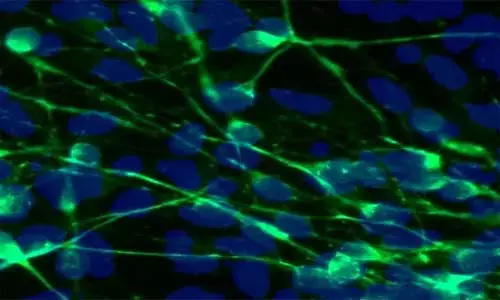- Home
- Medical news & Guidelines
- Anesthesiology
- Cardiology and CTVS
- Critical Care
- Dentistry
- Dermatology
- Diabetes and Endocrinology
- ENT
- Gastroenterology
- Medicine
- Nephrology
- Neurology
- Obstretics-Gynaecology
- Oncology
- Ophthalmology
- Orthopaedics
- Pediatrics-Neonatology
- Psychiatry
- Pulmonology
- Radiology
- Surgery
- Urology
- Laboratory Medicine
- Diet
- Nursing
- Paramedical
- Physiotherapy
- Health news
- Fact Check
- Bone Health Fact Check
- Brain Health Fact Check
- Cancer Related Fact Check
- Child Care Fact Check
- Dental and oral health fact check
- Diabetes and metabolic health fact check
- Diet and Nutrition Fact Check
- Eye and ENT Care Fact Check
- Fitness fact check
- Gut health fact check
- Heart health fact check
- Kidney health fact check
- Medical education fact check
- Men's health fact check
- Respiratory fact check
- Skin and hair care fact check
- Vaccine and Immunization fact check
- Women's health fact check
- AYUSH
- State News
- Andaman and Nicobar Islands
- Andhra Pradesh
- Arunachal Pradesh
- Assam
- Bihar
- Chandigarh
- Chattisgarh
- Dadra and Nagar Haveli
- Daman and Diu
- Delhi
- Goa
- Gujarat
- Haryana
- Himachal Pradesh
- Jammu & Kashmir
- Jharkhand
- Karnataka
- Kerala
- Ladakh
- Lakshadweep
- Madhya Pradesh
- Maharashtra
- Manipur
- Meghalaya
- Mizoram
- Nagaland
- Odisha
- Puducherry
- Punjab
- Rajasthan
- Sikkim
- Tamil Nadu
- Telangana
- Tripura
- Uttar Pradesh
- Uttrakhand
- West Bengal
- Medical Education
- Industry
New Imaging technique effectively measures mitochondrial dysfunction in motor neuron disease

Researchers from the Sheffield Institute for Translational Neuroscience (SITraN) have used a new imaging technique to measure the function of mitochondria in patients with motor neuron disease (MND).
The research, published today (13 January 2021) in the journal Brain could provide new ways to assess the effectiveness of treatments currently in development for MND.
Researchers used an advanced imaging technique called 31-phosphorus magnetic resonance spectroscopy to measure chemicals that are crucial to energy metabolism in the cell. The research was conducted on patients living with MND as well as age and gender matched healthy controls. The patient perceives the procedure as a standard MRI scan but researchers are able to gain a direct measurement of chemicals so that they can calculate a comprehensive picture of the energy status in patients with MND.
MND, or amyotrophic lateral sclerosis (ALS), as it is also known, is a disorder that affects the nerves - motor neurons - in the brain and spinal cord that form the connection between the nervous system and muscles to enable movement of the body. The messages from these nerves gradually stop reaching the muscles, leading them to weaken, stiffen and waste.
There are many barriers to developing effective treatments for MND as we don't yet fully understand how or why it develops in the first place. However, there is good evidence from laboratory data and disease models that the mitochondria - or powerhouses of the cell - may be impaired.
Lead author on the study, Dr Matilde Sassani from the University of Sheffield, explains: "It is important to have an effective technique to measure mitochondrial function in vivo in patients living with MND.
"In this study we found that phosphocreatine levels were depleted in the brain compared to healthy controls and, in the muscle, we found that inorganic phosphates were elevated in patients with MND. Both of these findings are consistent with mitochondrial dysfunction occurring in these people living with MND."
Dr Thomas Jenkins, senior author of the paper and Clinical Senior Lecturer at SITraN, said: "This research has the potential to impact the development of more effective treatments for MND. It appears to be a promising tool with potential to measure the effect of medications acting on mitochondrial function in people living with MND.
"Treatments that aim to rescue mitochondrial function in MND are being investigated in labs around the world. This non-invasive tool can demonstrate whether medications in development are successfully targeting mitochondria, which is an important step in selecting treatments to take through to clinical trials."
Future research aims to widen the scope of this study to include larger numbers of MND patients. As the mitochondria are also thought to be a factor in a range of other neurodegenerative diseases, there may be potential for this technique to be widened to different patient groups.
Hina Zahid Joined Medical Dialogue in 2017 with a passion to work as a Reporter. She coordinates with various national and international journals and association and covers all the stories related to Medical guidelines, Medical Journals, rare medical surgeries as well as all the updates in the medical field. Email: editorial@medicaldialogues.in. Contact no. 011-43720751
Dr Kamal Kant Kohli-MBBS, DTCD- a chest specialist with more than 30 years of practice and a flair for writing clinical articles, Dr Kamal Kant Kohli joined Medical Dialogues as a Chief Editor of Medical News. Besides writing articles, as an editor, he proofreads and verifies all the medical content published on Medical Dialogues including those coming from journals, studies,medical conferences,guidelines etc. Email: drkohli@medicaldialogues.in. Contact no. 011-43720751


